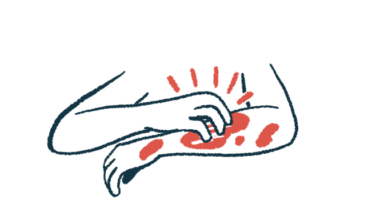1st Patient Treated in Phase 3 Trial of RDEB Gene Therapy, D-Fi

A first patient has been treated in a Phase 3 trial testing the investigational gene therapy D-Fi (debcoemagene autoficel), formerly known as FCX-007, on wounds in people with recessive dystrophic epidermolysis bullosa (RDEB).
“Our late-stage Phase 3 trial of D-Fi continues to progress for the localized treatment of RDEB, a devastating condition for too many families who currently do not have options beyond palliative care,” John Maslowski, CEO of Castle Creek Biosciences, which is now leading the therapy’s development, said in a press release.
“Dosing the first patient in the DeFi-RDEB study is a critical milestone that brings us closer to offering relief for the chronic, painful and debilitating wounds of RDEB that patients endure every day,” Maslowski added.
The DeFi-RDEB trial (NCT04213261) will assess whether D-Fi improves wound healing in up to 24 RDEB patients. The study is now underway at three U.S. sites: Stanford University in California, Children’s Hospital Colorado, in Aurora, and the Dell Children’s Medical Group in Austin, Texas. All are currently enrolling patients; more information can be found here.
Patients, ages 2 or older, with a confirmed COL7A1 gene mutation (the known cause of RDEB) and with at least two eligible wound sites are eligible for enrollment.
Up to three wounds in each participant will be treated with D-Fi, while a corresponding wound will remain untreated for comparison. D-Fi, given as intradermal (into-the-skin) injections, will be administered in at least two sessions, 12 weeks apart. Further sessions may be given at week 24 (six months) and week 36 (nine months) in treated wounds not fully closed and to corresponding wounds initially left untreated.
Wound closure and safety will be evaluated throughout the trial’s nearly one year (48 week) period. The study’s main goal is complete wound closure of the first wound pair at week 24. Patients will then be followed for safety for up to 15 years.
D-Fi, originally developed by Fibrocell Science, now part of Castle Creek, is a personalized cell-based therapy made from a patient’s own dermal fibroblasts, a type of skin cell. After being collected, the cells are genetically modified in the lab to produce a healthy version of type VII collagen (COL7). The modified cells are then injected back to the patient.
Collagen is a key protein responsible for maintaining proper skin structure and resistance. COL7 is defective in RDEB patients, leaving their skin extremely fragile.
“Our goal is to develop a durable personalized treatment that is compatible with each patient’s unique biology,” said Mary Spellman, MD, chief medical officer of Castle Creek.
D-Fi is delivered locally to the wound site, allowing the healthy COL7 protein to help hold the skin layers together. Its local application lowers the risk of side effects, the company reports. It also should not carry a risk of immune reactions as it is made from a patient’s own fibroblasts.
“We have an opportunity to deliver functional COL7 protein where it is needed — by intradermal administration in wounds of RDEB patients,” Spellman added.
Early results from an ongoing Phase 1/2 trial (NCT02810951) in four adults with RDEB supported the therapy’s safety and efficacy, with treated wounds healing by more than half in four weeks and completely after one year. No serious adverse effects were reported, and the therapy was considered safe and well tolerated up to one year after the injection.
D-Fi has been given regenerative medicine advanced therapy, orphan drug, rare pediatric disease, and fast track status by the U.S. Food and Drug Administration, supporting and speeding its clinical development.






